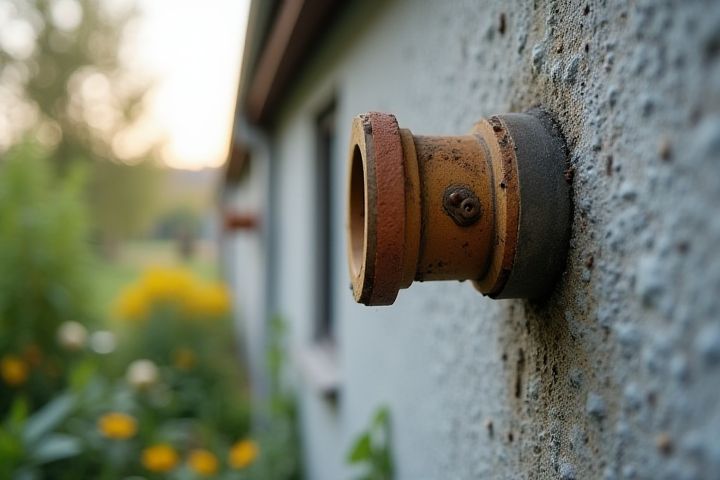
Good ventilation enhances indoor air quality by facilitating the circulation of fresh air, which dilutes pollutants and regulates humidity levels. Proper airflow helps prevent the buildup of mold, allergens, and volatile organic compounds (VOCs), creating a healthier living environment for you and your family. Effective ventilation also helps maintain a comfortable temperature, reducing reliance on heating and cooling systems, thereby lowering energy bills. Incorporating exhaust fans and strategically placed windows ensures stale air is expelled while fresh air enters, promoting a balanced atmosphere. Ultimately, a well-ventilated house contributes to structural integrity, preventing moisture damage and prolonging the lifespan of your home.
Why Does A House Need Good Ventilation
Prevents moisture buildup
Good ventilation in a house is essential for preventing moisture buildup, which can lead to mold and mildew development. Proper airflow regulates humidity levels, ideally keeping them between 30% and 50%, thereby safeguarding your home's structural integrity and indoor air quality. Excess moisture can compromise insulation effectiveness and weaken materials like wood, leading to costly repairs. By ensuring optimal ventilation through windows, vents, and exhaust systems, you protect both your health and your investment.
Reduces indoor air pollutants
Good ventilation significantly reduces indoor air pollutants, which can accumulate from various sources such as cooking, cleaning agents, and building materials. These pollutants can lead to health issues, including respiratory problems and allergies, affecting the well-being of you and your family. By ensuring adequate air exchange, your home maintains a fresh and healthy environment, improving overall air quality. In fact, proper ventilation can decrease the concentration of harmful substances by up to 60%, making it an essential aspect of home maintenance.
Controls indoor temperature
Good ventilation is essential for regulating indoor temperature, as it allows for the circulation of fresh air, preventing overheating or excessive humidity. In homes with proper airflow, temperatures can remain consistent, reducing the reliance on heating and cooling systems, which can save you up to 30% on energy costs. Effective ventilation systems, such as exhaust fans and passive air vents, can help maintain a comfortable environment year-round. By ensuring adequate airflow, you can improve indoor air quality and create a healthier living space, which is crucial for your well-being.
Enhances air quality
Good ventilation is essential for enhancing air quality in your home, as it helps to remove stale air, pollutants, and excess moisture. With proper ventilation, harmful indoor contaminants, such as volatile organic compounds (VOCs) and carbon dioxide (CO2), are effectively minimized, leading to healthier living conditions. Studies indicate that adequate air exchange can reduce allergens and improve respiratory health, as a well-ventilated space tends to have lower levels of mold and dust mites. Investing in a ventilation system can significantly boost your home's overall air quality, promoting a safer and more comfortable environment for you and your family.
Prevents mold growth
Good ventilation is essential for preventing mold growth in your home, as it effectively regulates humidity levels. Keeping indoor humidity below 60% significantly reduces the chances of mold development. Proper air circulation allows moisture from showers, cooking, and laundry to dissipate, ensuring that your living environment remains dry and healthy. Investing in ventilation systems or utilizing exhaust fans can help maintain optimal air quality, minimizing the risk of mold-related health issues.
Energy efficiency
Good ventilation is crucial for energy efficiency in a house, as it helps regulate indoor air quality and temperature. Proper airflow reduces the reliance on heating and cooling systems, potentially cutting energy costs by up to 30%. By preventing moisture buildup, effective ventilation also minimizes the risk of mold growth, which can lead to costly repairs and health issues. An energy-efficient home not only provides comfort but also contributes to a reduced carbon footprint, supporting sustainable living practices.
Reduces condensation
Good ventilation in a house is essential because it significantly reduces condensation, which can lead to mold growth and structural damage. With approximately 40% of humidity in indoor air, proper airflow helps maintain moisture levels below 60%, preventing excess water vapor from settling on surfaces. The installation of vents or exhaust fans can lower indoor humidity by promoting air exchange, reducing the risk of health issues related to dampness. Ensuring your home has adequate ventilation not only protects your living environment but also enhances energy efficiency and comfort.
Eliminates odors
Good ventilation is essential in a house as it effectively eliminates odors caused by cooking, pets, and other household activities. By allowing fresh air to circulate, ventilation helps dilute and remove unwanted smells, improving overall indoor air quality. Research shows that well-ventilated spaces can reduce airborne contaminants by up to 75%, making your home healthier and more pleasant. Moreover, proper ventilation systems, like exhaust fans and open windows, play a critical role in maintaining a fresh environment, ensuring that you and your family can enjoy a clean and odor-free living space.
Protects structural integrity
Good ventilation is essential for protecting your home's structural integrity, as it helps regulate moisture levels. Excess humidity can lead to mold growth, which can compromise wood structures, leading to costly repairs. Moreover, proper airflow minimizes condensation on walls and ceilings, reducing the risk of rot and decay in materials like drywall and insulation. Ensuring that your house is well-ventilated can extend the lifespan of these critical components, maintaining a healthy living environment.
Improves comfort levels
Good ventilation significantly improves comfort levels in a house by ensuring a consistent flow of fresh air throughout the living spaces. This process helps regulate temperature and humidity, making conditions more pleasant and less prone to stuffiness. Effective ventilation can also reduce indoor pollutants, allergens, and odors, contributing to a healthier atmosphere that enhances your overall well-being. A well-ventilated home can lead to energy savings as it reduces the need for excessive heating or cooling, ultimately creating a more comfortable environment.
